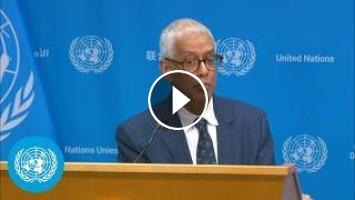Press Briefing by Farhan Haq, Deputy Spokesperson for the Secretary-General.
Highlights:
-Integrated Food Security Phase Classification Report
-U.N.R.W.A.
-Occupied Palestinian Territory
-Nuclear Disarmament
-Colombia
-Haiti
-Ukraine
-South Sudan
-Democratic Republic of the Congo
-Yemen
INTEGRATED FOOD SECURITY PHASE CLASSIFICATION REPORT
You’ve just heard an extremely somber briefing on the latest Integrated Food Security Phase Classification report, and I’d like to add that the Secretary-General said this morning that the report’s findings on food insecurity in Gaza are an appalling indictment of conditions on the ground for civilians.
He said that more than half of all Palestinians in Gaza –1.1 million people– have completely exhausted their food supplies and are facing catastrophic hunger, according to the report. This is an entirely manmade disaster, the Secretary-General emphasized, and the report makes clear that it can be halted.
The Secretary-General calls on the Israeli authorities to ensure complete and unfettered access for humanitarian goods throughout Gaza and for the international community to fully support our humanitarian efforts.
U.N.R.W.A.
Meanwhile, the Commissioner General for the UN Relief and Works Agency, Philippe Lazzarini, said that the Israeli Authorities had denied his entry to Gaza today.
In light of the report showing that famine is imminent in the northern Gaza Strip, Mr. Lazzarini said that he had tried to visit Gaza today to coordinate and improve the humanitarian response. He noted that UNRWA has by far the largest presence among all humanitarian organizations in Gaza.
The Commissioner General said that too much time has been wasted, and all land crossings must open now. Famine can be averted with political will, he said.
OCCUPIED PALESTINIAN TERRITORY
And an update on the humanitarian front, the Office for the Coordination of Humanitarian Affairs says that intense Israeli bombardment and ground operations – as well as heavy fighting between Israeli forces and Palestinian armed groups – continue to be reported across much of the Gaza Strip, particularly in Deir Al Balah and near Al Shifa Hospital in Gaza city, in the north.
Despite the ongoing hostilities and other impediments, we and our humanitarian partners are trying to get life-saving aid to civilians in Gaza wherever and whenever we can.
Last night, the World Food Programme delivered 18 truckloads of food supplies – including wheat flour, food parcels and ready-to-eat rations – to Gaza city, via a new route along the border. OCHA said this route needs to be made available for daily convoys so that we can have consistent and safe access to the north.
Meanwhile, the Director-General of the World Health Organization, Dr. Tedros Ghebreyesus, said he is terribly worried about the situation at Al-Shifa Hospital, which is endangering civilians – both patients and health workers. He reiterated that hospitals should never be battlegrounds and must be protected. On Saturday, a WHO team visited the European Gaza Hospital in Khan Younis, in southern Gaza, to bring medical supplies for some 80,000 patients and assess water, sanitation and hygiene capacities at the facility.
And on Sunday, WHO, UNRWA and the UN Mine Action Service delivered some 10,500 litres of fuel to Nasser Hospital, also in Khan Younis. While there, they evaluated safety concerns and assessed conditions for the resumption of essential services.
NUCLEAR DISARMAMENT
This morning, the Secretary-General spoke at the Security Council open debate on nuclear disarmament and non-proliferation.
He said that almost eight decades after the incineration of Hiroshima and Nagasaki, nuclear weapons still represent a clear and present danger to global peace and security.
Today, he added, we meet at a time when geopolitical tensions and mistrust have escalated the risk of nuclear warfare to its highest point in decades.
Humanity cannot survive a sequel to Oppenheimer, the Secretary-General told members of the Security Council.
He said that September’s Summit of the Future — and the Pact that will emerge — will be an important moment for the world to gather around concrete reforms to the global disarmament architecture and the bodies and institutions that uphold it.
He also told council members that they have an opportunity to lay down a marker. To look beyond today’s divisions, and state clearly that living with the existential threat of nuclear weapons is unacceptable.
Full highlights: https://www.un.org/sg/en/content/noon-briefing-highlight?date%5Bvalue%5D%5Bdate%5D=18%20March%202024
Highlights:
-Integrated Food Security Phase Classification Report
-U.N.R.W.A.
-Occupied Palestinian Territory
-Nuclear Disarmament
-Colombia
-Haiti
-Ukraine
-South Sudan
-Democratic Republic of the Congo
-Yemen
INTEGRATED FOOD SECURITY PHASE CLASSIFICATION REPORT
You’ve just heard an extremely somber briefing on the latest Integrated Food Security Phase Classification report, and I’d like to add that the Secretary-General said this morning that the report’s findings on food insecurity in Gaza are an appalling indictment of conditions on the ground for civilians.
He said that more than half of all Palestinians in Gaza –1.1 million people– have completely exhausted their food supplies and are facing catastrophic hunger, according to the report. This is an entirely manmade disaster, the Secretary-General emphasized, and the report makes clear that it can be halted.
The Secretary-General calls on the Israeli authorities to ensure complete and unfettered access for humanitarian goods throughout Gaza and for the international community to fully support our humanitarian efforts.
U.N.R.W.A.
Meanwhile, the Commissioner General for the UN Relief and Works Agency, Philippe Lazzarini, said that the Israeli Authorities had denied his entry to Gaza today.
In light of the report showing that famine is imminent in the northern Gaza Strip, Mr. Lazzarini said that he had tried to visit Gaza today to coordinate and improve the humanitarian response. He noted that UNRWA has by far the largest presence among all humanitarian organizations in Gaza.
The Commissioner General said that too much time has been wasted, and all land crossings must open now. Famine can be averted with political will, he said.
OCCUPIED PALESTINIAN TERRITORY
And an update on the humanitarian front, the Office for the Coordination of Humanitarian Affairs says that intense Israeli bombardment and ground operations – as well as heavy fighting between Israeli forces and Palestinian armed groups – continue to be reported across much of the Gaza Strip, particularly in Deir Al Balah and near Al Shifa Hospital in Gaza city, in the north.
Despite the ongoing hostilities and other impediments, we and our humanitarian partners are trying to get life-saving aid to civilians in Gaza wherever and whenever we can.
Last night, the World Food Programme delivered 18 truckloads of food supplies – including wheat flour, food parcels and ready-to-eat rations – to Gaza city, via a new route along the border. OCHA said this route needs to be made available for daily convoys so that we can have consistent and safe access to the north.
Meanwhile, the Director-General of the World Health Organization, Dr. Tedros Ghebreyesus, said he is terribly worried about the situation at Al-Shifa Hospital, which is endangering civilians – both patients and health workers. He reiterated that hospitals should never be battlegrounds and must be protected. On Saturday, a WHO team visited the European Gaza Hospital in Khan Younis, in southern Gaza, to bring medical supplies for some 80,000 patients and assess water, sanitation and hygiene capacities at the facility.
And on Sunday, WHO, UNRWA and the UN Mine Action Service delivered some 10,500 litres of fuel to Nasser Hospital, also in Khan Younis. While there, they evaluated safety concerns and assessed conditions for the resumption of essential services.
NUCLEAR DISARMAMENT
This morning, the Secretary-General spoke at the Security Council open debate on nuclear disarmament and non-proliferation.
He said that almost eight decades after the incineration of Hiroshima and Nagasaki, nuclear weapons still represent a clear and present danger to global peace and security.
Today, he added, we meet at a time when geopolitical tensions and mistrust have escalated the risk of nuclear warfare to its highest point in decades.
Humanity cannot survive a sequel to Oppenheimer, the Secretary-General told members of the Security Council.
He said that September’s Summit of the Future — and the Pact that will emerge — will be an important moment for the world to gather around concrete reforms to the global disarmament architecture and the bodies and institutions that uphold it.
He also told council members that they have an opportunity to lay down a marker. To look beyond today’s divisions, and state clearly that living with the existential threat of nuclear weapons is unacceptable.
Full highlights: https://www.un.org/sg/en/content/noon-briefing-highlight?date%5Bvalue%5D%5Bdate%5D=18%20March%202024
- Category
- United Nations
- Tags
- UN, United Nations, UNGA
Be the first to comment













